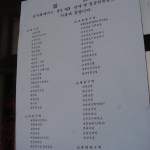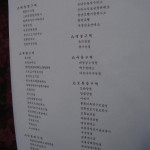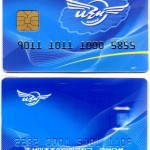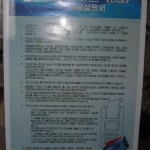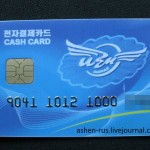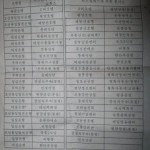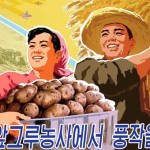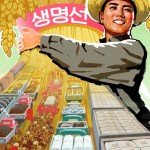North Korea may face Western sanctions over its illicit nuclear weapons program, but nothing seems to stand in the way of efforts to boost the English language in the reclusive state.
What is clear is that Pyongyang is drawing more foreigners to teach English, and that the English level of North Korean students appears to be improving.
Several foreign nongovernmental organizations which have received approval from the North Korean government to send English language teachers to the impoverished country are scouting for candidates through their websites.
For example, the Mennonite Central Committee (MCC), a Christian group based in the United States and Canada, said on its website that it was “seeking two native-English-speaking Canadian teachers to teach English at a middle school in North Korea.”
“In addition to providing English teaching and training, the opportunity to live and work in North Korea will serve to build bridges of understanding between countries,” the MCC said.
It requires the teachers by July for a 13-month assignment.
“Middle school students in the DPRK (North Korea’s official name) have up until now been studying English from Korean teachers only, not from foreign teachers,” the MCC said.
“The move towards inviting foreign teachers to teach at the middle-school level indicates a new push or interest in equipping North Korean students especially in spoken English.”
Qualified
Another group campaigning for funds to boost the teaching of English in North Korea is the Wellington, New Zealand-based NZ DPRK Society.
It is “seeking NZ$11,000 [U.S.$ 8,580] to fund a qualified New Zealand volunteer teacher to teach English in Pyongyang for three months in 2011,” according to its website.
The society, whose objective is to increase awareness and understanding between the people of New Zealand and North Korea, had sent a teacher from Christchurch to Pyongyang in 2006—the first Westerner to teach at the primary or secondary education level in North Korea. The teacher, Tim Kearns, returned again in 2008.
“Everybody was very happy about this. The North Korean students and teachers learnt a lot about life outside North Korea, especially in New Zealand. The students loved Tim. The authorities appreciated his input into improvement of English,” the society said.
The society’s new volunteer will spend three months from July teaching secondary school students at Pyongyang’s Kumsong School and Kumsong Middle School No.1, which caters to “bright students who will go onto university and in the future will occupy top jobs in the civil service.”
“English is a crucial language for young North Koreans to learn if they are to become part of the world community.”
On the rise
Other groups, including the British Council, Canada’s Trinity Western University, and Global Resource Services in the United States, have also dispatched volunteer English teachers to North Korea, and the number of native instructors in North Korea is on the rise.
At the same time, the TOEFL (Test of English as a Foreign Language) scores of North Korean students—meant to determine the students’ English language proficiency—have been improving.
“In 2009, the world average TOEFL score was 80 points. North Korean nationals who took the test averaged 75 points” out of a maximum of 120 points, said Tom Ewing, public information officer for Educational Testing Service (ETS), the organization that administers the TOEFL.
“Test takers of North Korean nationality scored an average 72 points in 2008, and 69 points in 2007—a 6-point improvement over a 3-year period,” he said.
The 2009 TOEFL statistical data, published in December 2010, indicate that North Korean nationals scored an average 18 points in reading, 18 in listening comprehension, 19 in speaking, and 20 in written composition, Ewing said.
Overseas
ETS does not have specific personal details of the more than 4,000 TOEFL test takers every year since 2002 claiming North Korean nationality.
There is no North Korean institution tasked with administering TOEFL in the country, and TOEFL tests are not conducted in North Korea.
It is believed that among the test takers are children of officials dispatched overseas and ethnic Koreans in Japan claiming North Korean citizenship.
Robert DeCamp, an American who visited North Korea in the fall of 2010, said that the English conversation skills of his North Korean tourist guides were impressive.
The guides included North Korean women in their 20s who had graduated from the Pyongyang University of Foreign Studies and who had never traveled to Anglophone countries.
They spoke easily understandable, sophisticated English, with no heavy accent at all, DeCamp said.
“I would say that the English capabilities of the guides were quite good. I was pretty impressed with their English. They were very easy to understand, had a very minimal accent, and had pretty polished English considering they had never been to an English-speaking country.”
American North Korea experts who have recently visited the hardline communist state pointed out that unlike the ordinary young people of North Korea, the children of the elite displayed an impressive command of English.
South Korea has hired tens of thousands of foreign English teachers to meet the increasing demand for English education. Little is known, however, about North Korea’s interest in the subject.
But news reports say that North Korea recently requested that a Canadian relief agency send English teachers. The Mennonite Central Committee will select two English teachers and send them to North Korea to teach from September this year until July 2012.
The agency said that this is the first time North Korea has requested English teachers and believes the move is meant to enhance the English-speaking ability of students.
Another agency in New Zealand has posted a notice on its website recently, saying they are raising funds to send a voluntary teacher to teach for three months in 2011 in Pyongyang, according to the Radio Free Asia report Tuesday. The NZ-DPRK Society sent the first westerner to teach English in a North Korean school in 2006. Tim Kearn, a former school teacher in Christchurch, had spent two years in North Korea, teaching English at three secondary schools in Pyongyang.
The Society estimates that the total cost to send a teacher to North Korea for three months will be about $8,000. It emphasizes that English education is essential for North Korea because the isolated country can increase exchanges with outside world and eventually become a member of the international community.
The report said that more foreign English teachers come to North Korea via cultural and academic institutes. The British Council has been running an English-teacher training program in Pyongyang since 2000. The Trinity Western University in Canada also sends a team of professors and graduates to North Korea.
An American who recently visited Pyongyang praised the English speaking level of female tour guides there.
“I would say that the English capabilities of the guides were quite good. I was pretty impressed with their English. They were very easy to understand, had a very minimal accent, and had pretty polished English considering they had never been to an English-speaking country,” DeCamp was quoted as saying in the Radio Free Asia report.
With the increase in the number of foreign English teachers in North Korea, the average TOEFL score of North Koreans jumped six points from an average of 69 in 2007 to 75 in 2009, just five points below the world average, which is 80.
South Korea achieved an average score of 81 in 2009, a four-point increase from 2007.

